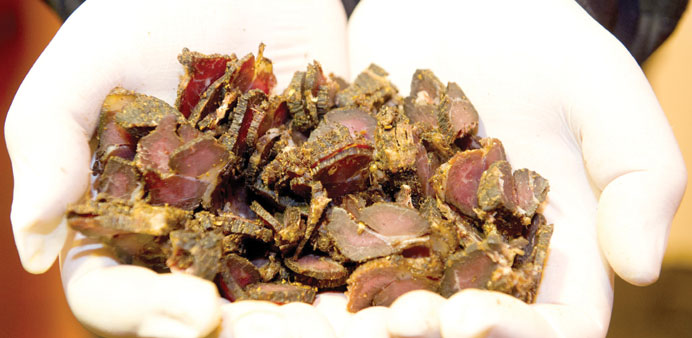By Ralf E Krüger
Beindorff is a self-confessed South Africa fan and he has just found something he’s been looking for a long time. He slides a thin piece of cured meat into his mouth in a market hall in Hanover.
Biltong, cured meat from South Africa, is a new delicacy for most Europeans. Since the last soccer World Cup in South Africa biltong has spread beyond the country’s borders. The EU’s tough regulations on meat imports have made it difficult for biltong’s fans abroad, but now a European version is on the market.
Biltong is slowly gaining ground across Germany. The latest local biltong producer comes from Hanover.
“I began making it six months ago in small quantities but now I can hardly keep up with demand,” says Deon Yon. Yon is from South Africa and is married to a German. He recently returned from Cape Town where he bought production machinery for his biltong.
A typical European biltong fan is someone who has been to either South Africa or Namibia where they first tasted it. Biltong is made from air-dried beef, ostrich or wild game meat and is available in a wide range of spicy varieties.
Dutch settlers in South Africa are credited with “inventing” biltong. They preserved meat by air drying it and rubbing it with salt, pepper, spices and vinegar.
The name is believed to be a compound of the Dutch words “bil”, meaning rear end, and “tong”, which means strip. Biltong is often eaten by athletes and hikers because of its high protein content. It has been used in muffins, bread, stews and even ice cream.
Strips of biltong are up to 2-cm wide and look a little like meat crisps. Most Europeans are perplexed when they first see it.
“One of my customers, who did not know biltong, compared it to dog food,” says Deon Yon with a note of indignation in his voice. “But its looks and smell mask its wonderful taste. It’s really very fine,” says a customer in Hanover market as she tries her first piece of biltong.
Biltong has always had its fans in Germany but the problem has been importing it. “Unless you have special permission, you cannot import biltong into the EU,” says Hans-Werner Vischer from the customs office in Hanover. But getting that permission involves a lot of paperwork and costs money as well.
Anyone who brings biltong bought in an African duty-free shop into Europe will see it confiscated at the airport. No surprise then that the few companies that do manage to import it charge a high price to their gourmet customers.
“It takes a lot of effort to make biltong. A kilogram requires 2.5kg of beef,” says the manager of “Safari Biltong”. The company has a licence to make about eight tonnes of biltong a year from beef. It’s then exported to Switzerland, Austria and Sweden.
The wild game imports from South Africa are expensive and have been hindered in the past by outbreaks of foot-and-mouth disease. An 80g pack of biltong made from imported zebra-meat costs $12.
Yon’s biltong costs $7 for 90g. “I want to keep it an exclusive product. I do it because I love biltong but it also fills a gap in the market,” he says. – DPA

